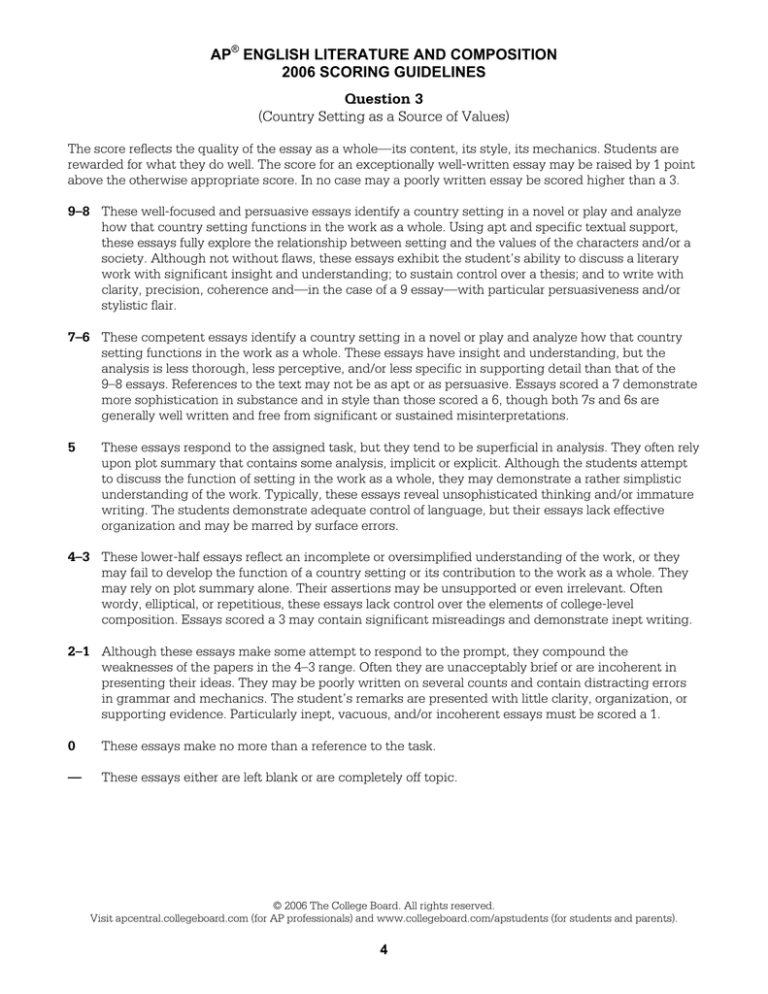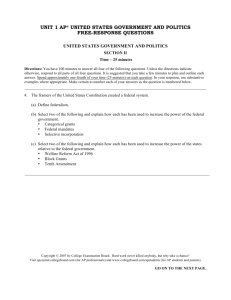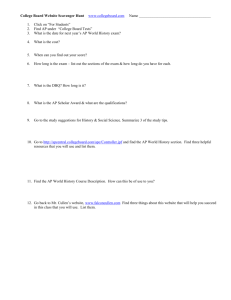
AP® ENGLISH LITERATURE AND COMPOSITION
2006 SCORING GUIDELINES
Question 3
(Country Setting as a Source of Values)
The score reflects the quality of the essay as a whole—its content, its style, its mechanics. Students are
rewarded for what they do well. The score for an exceptionally well-written essay may be raised by 1 point
above the otherwise appropriate score. In no case may a poorly written essay be scored higher than a 3.
9–8 These well-focused and persuasive essays identify a country setting in a novel or play and analyze
how that country setting functions in the work as a whole. Using apt and specific textual support,
these essays fully explore the relationship between setting and the values of the characters and/or a
society. Although not without flaws, these essays exhibit the student’s ability to discuss a literary
work with significant insight and understanding; to sustain control over a thesis; and to write with
clarity, precision, coherence and—in the case of a 9 essay—with particular persuasiveness and/or
stylistic flair.
7–6 These competent essays identify a country setting in a novel or play and analyze how that country
setting functions in the work as a whole. These essays have insight and understanding, but the
analysis is less thorough, less perceptive, and/or less specific in supporting detail than that of the
9–8 essays. References to the text may not be as apt or as persuasive. Essays scored a 7 demonstrate
more sophistication in substance and in style than those scored a 6, though both 7s and 6s are
generally well written and free from significant or sustained misinterpretations.
5
These essays respond to the assigned task, but they tend to be superficial in analysis. They often rely
upon plot summary that contains some analysis, implicit or explicit. Although the students attempt
to discuss the function of setting in the work as a whole, they may demonstrate a rather simplistic
understanding of the work. Typically, these essays reveal unsophisticated thinking and/or immature
writing. The students demonstrate adequate control of language, but their essays lack effective
organization and may be marred by surface errors.
4–3 These lower-half essays reflect an incomplete or oversimplified understanding of the work, or they
may fail to develop the function of a country setting or its contribution to the work as a whole. They
may rely on plot summary alone. Their assertions may be unsupported or even irrelevant. Often
wordy, elliptical, or repetitious, these essays lack control over the elements of college-level
composition. Essays scored a 3 may contain significant misreadings and demonstrate inept writing.
2–1 Although these essays make some attempt to respond to the prompt, they compound the
weaknesses of the papers in the 4–3 range. Often they are unacceptably brief or are incoherent in
presenting their ideas. They may be poorly written on several counts and contain distracting errors
in grammar and mechanics. The student’s remarks are presented with little clarity, organization, or
supporting evidence. Particularly inept, vacuous, and/or incoherent essays must be scored a 1.
0
These essays make no more than a reference to the task.
—
These essays either are left blank or are completely off topic.
© 2006 The College Board. All rights reserved.
Visit apcentral.collegeboard.com (for AP professionals) and www.collegeboard.com/apstudents (for students and parents).
4
© 2006 The College Board. All rights reserved.
Visit apcentral.collegeboard.com (for AP professionals) and www.collegeboard.com/apstudents (for students and parents).
© 2006 The College Board. All rights reserved.
Visit apcentral.collegeboard.com (for AP professionals) and www.collegeboard.com/apstudents (for students and parents).
© 2006 The College Board. All rights reserved.
Visit apcentral.collegeboard.com (for AP professionals) and www.collegeboard.com/apstudents (for students and parents).
© 2006 The College Board. All rights reserved.
Visit apcentral.collegeboard.com (for AP professionals) and www.collegeboard.com/apstudents (for students and parents).
© 2006 The College Board. All rights reserved.
Visit apcentral.collegeboard.com (for AP professionals) and www.collegeboard.com/apstudents (for students and parents).
© 2006 The College Board. All rights reserved.
Visit apcentral.collegeboard.com (for AP professionals) and www.collegeboard.com/apstudents (for students and parents).
© 2006 The College Board. All rights reserved.
Visit apcentral.collegeboard.com (for AP professionals) and www.collegeboard.com/apstudents (for students and parents).
AP® ENGLISH LITERATURE AND COMPOSITION
2006 SCORING COMMENTARY
Question 3
Overview
The prompt for Question 3, the “open” question, began by noting that many writers use a country setting
to establish values within a work of literature and illustrated that proposition by pointing out that the
country may be a place of virtue and peace or one of primitivism and ignorance. Students were then asked
to choose a novel or play in which such a country setting plays a significant role and write an essay in
which they analyzed how the country setting functions in the work as a whole.
The aim of the prompt was to assess students’ ability to connect the country setting to values, thereby
linking artistry to technique with theme, idea, or meaning. The illustrative phrase, “a place of virtue and
peace or one of primitivism and ignorance,” suggested to students that setting can convey a range of
positive or negative attributes. Moreover, the prompt deliberately focused on setting to steer students
away from plot summary, the too-familiar bane of Question 3. The emphasis upon “analyze how the
country setting functions” was designed to discriminate between upper- and lower-level essays.
Sample: 3A
Score: 8
This essay provides a persuasive, detailed analysis of the setting in Jane Austen’s Persuasion. Well organized
and fully developed, it offers three different ideas about how the setting establishes values in the novel. First,
Anne’s virtuous “qualities of intelligence, kindness and modesty are held in high regard” in the countryside.
Second, unlike in Bath, in the woods Anne can undergo the self-reflection and self-examination that enable
her to “reflect on how she should act and [on] the characters of the people” surrounding her. Finally, the
country nurtures Anne, helping her to “understand who she is and develop into a woman who does not blame
herself for her past.” Using apt and specific textual support and developing its ideas in clear and lucid prose,
this essay makes a strong case for its assertions.
Sample: 3B
Score: 6
This essay on The Importance of Being Earnest contrasts the two settings—country and city—in rich detail
but doesn’t think deeply about the meaning or the values being addressed in the play. For example, the
student gets sidetracked into discussing at length the “comedic confusion” arising from the lack of
separation that occurs between Jack’s two worlds as the play progresses, but that digression does not fully
respond to the question posed. While the essay does address the topic of a country setting by choosing an
appropriate work and correctly understanding that the country “serves as Jack’s haven of tranquility from the
drama of his urban-life,” the conclusion this student reaches is rather pedestrian: “The countryside setting
. . . serves as an agent of confusion . . . [and] makes[s] the work a comedy.”
Sample: 3C
Score: 4
This essay on As I Lay Dying looks at the southern United States as a country that is backward and
ignorant. This witty writer, who remembers plot details very well, organizes the essay around three
characters who seem to illustrate backwardness, but this unfortunately leads the organization away from
any focus on country or setting. As a result, the essay is thin on assertions that respond to the prompt; it
makes claims that degrade the South (“Faulkner knew all too well the backward ways of the south. So, he
blamed everything on the environment instead of characters’ ignorance.”), demonstrating, in the words of
the scoring guidelines, an “incomplete or oversimplified understanding of the work.” The essay also fails
to develop how the country setting functions in the work as a whole.
© 2006 The College Board. All rights reserved.
Visit apcentral.collegeboard.com (for AP professionals) and www.collegeboard.com/apstudents (for students and parents).


